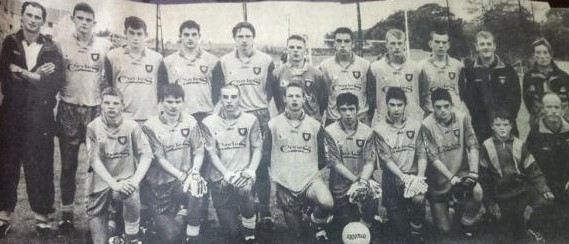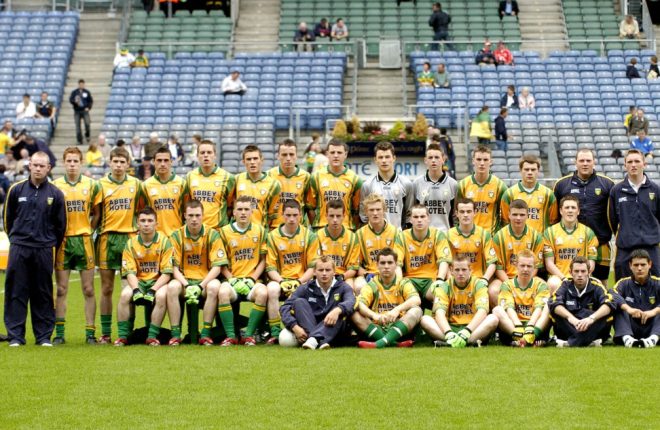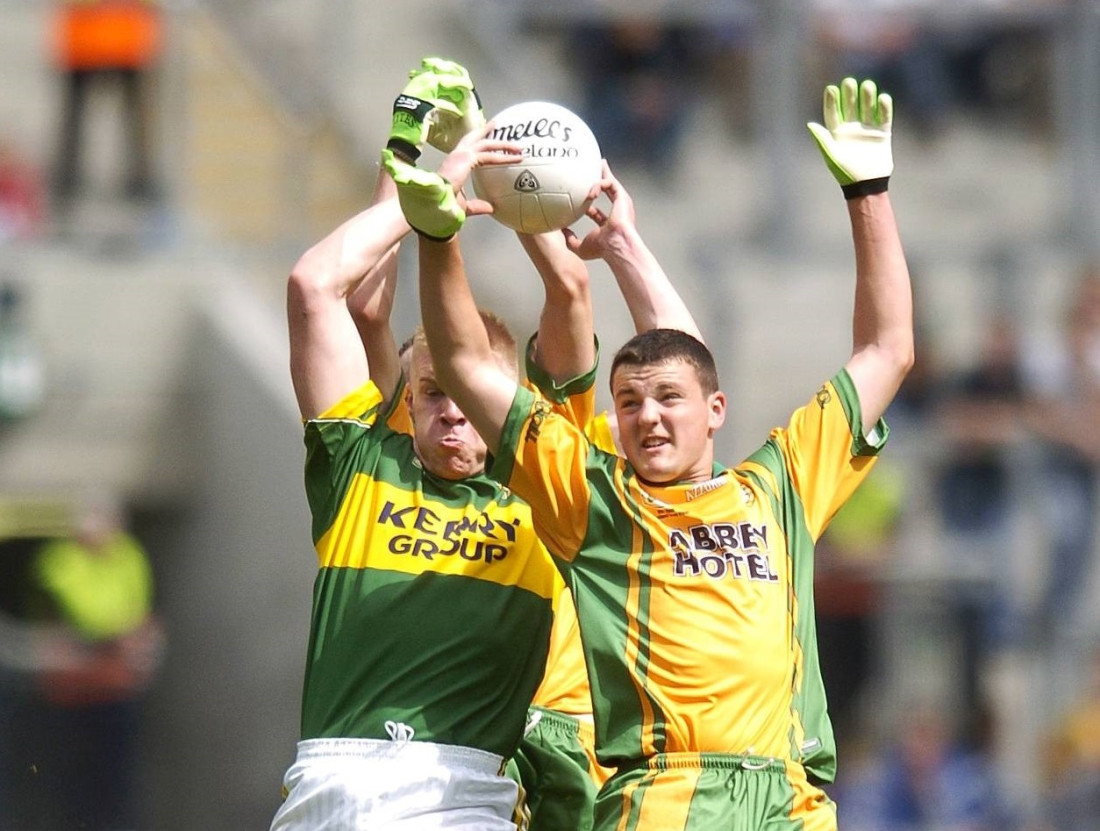Sunday will be Donegal’s 11th Ulster final in 14 seasons. Michael McMullan spoke with All-Ireland winning captain Michael Murphy and former county chairman John McConnell to look into the foundations.
DONEGAL didn’t place their long-term succession planning on the crest of the 1992 All-Ireland wave. John McConnell has the benefit of hindsight when outlining why they took out their spades six years later.
To rubberstamp the importance of success, when asked of his earliest footballing memory, 2012 winning captain Michael Murphy doesn’t need a second to think. 1992. Instantaneous.
Aged just three at the time, the years that immediately followed left an imprint on the man who’d captain the second half of Donegal’s 10 Ulster winning teams.
A young Murphy watched the footage of Donegal’s first All-Ireland win over and over during his primary school years. Every passage of play has been since ingrained.
Any meeting with his heroes would leave him wanting to follow in the footsteps he has left others looking towards.
“If you went over to Ardara and you bumped into Anthony Molloy, for the rest of that evening, the next day and the day after and all week you were out the back of the house pretending to be Anthony Molloy,” he explains.
There were the tears and pain of losing to Derry in the 1998 final. Donegal’s paltry half a dozen points as Fermanagh prevailed in a low-scoring 2003 Ulster opener in Brewster Park another memory.
Defeat cuts deep. Given the chance, Murphy vowed he’d throw his shoulder to any wheel of change.
Jim McGuinness came on board at the heel of 2010. He pulled the county up from a perceived 19th place in the Irish News county rankings.
Sunday is an 11th Ulster final appearance since. Scratch the surface and in the 11 years before Murphy lifted the Anglo Celt for the first time, Donegal appeared in nine Buncrana Cup finals. Green shoots.
It was an Ulster u-16 competition started in 2000 and dedicated to Buncrana youngsters Oran Doherty, Sean McLaughlin and James Barker who – along with Spaniards Rocio Abad Ramos and Fernando Blasco Baselga – were killed in the Omagh bomb two years earlier.
McConnell, Martin McHugh of the county’s GAA academy and youth officer Michael McMenamin came up with the idea of digging deeper into the county’s underage.

FIRST TIME…The Donegal u-16 team of 2000, winners of the first Buncrana Cup contained two members of the 2012 All-ireland winning team. Eamon McGee (back, third left) and Karl Lacey (front, third left). Michael Murphy is pictured (front, second right) beside his father Mick who was a selector with the team.
If the Donegal vocational school team came good in the same year St Eunan’s, Letterkenny, De La Salle, Ballyshannon or PCC Falcarragh were setting the pace in the MacLarnon Cup, the county wouldn’t be far away at minor level.
When Donegal reached their first All-Ireland minor final in 2014, St Eunan’s saw off the now defunct Coláistí Inis Eoghain side – made up of schools from Inishowen – in the MacLarnon final.
Before the Buncrana Cup, Donegal spent the best part of 15 years in the Ted Webb u-16 competition in Connacht.
By the middle of the nineties, McConnell, with help from McMenamin, McHugh and PJ Buggy, set up the GAA School of Excellence in 1998.
Geographically, Donegal is a vast county without the consistent MacRory Cup lever of other counties.
With McHugh as a figurehead, it didn’t take much selling at county board level.
Trials took place between teams from all five divisional boards. It was a deep dig to find the top 40 u-14 players in the county.
Patsy Kilgannon steered some AIB sponsorship funds to help the project off the ground.
“We hosted them down in Ballyconnell House in Falcarragh,” McConnell outlined.
“Players were exposed to top quality coaches and information. The boys were there from Friday to Sunday evening, kept overnight and went through all their different sessions and talks.”
The following year, McHugh took over the county u-16 team that lifted the Ted Webb Cup after a resounding win over Mayo in the final down in Ballyhaunis.
Barry Dunnion was captain. Another Four Masters man, Paul Durcan, was handed a number one jersey for the first time after an underage career outfield.
Colm McFadden bagged 1-5 with St Michael’s clubmate Christy Toye hitting four points. Some 13 years later, all four were on the bus with Murphy and co. as Sam returned to the hills.
In a Donegal News interview with McFadden before the 2014 All-Ireland final, writer Chris McNulty his u-16 tally was 1-31 over three games with Toye notching a staggering 3-27.
By the following season, Donegal were the first winners of the Buncrana Cup. It was a team that included Eamon McGee and Karl Lacey.
“From the first three squads, ‘98, ‘99 and 2000. we had eight of the starting team from 2012 and 15 of the panel would have gone through those first three years,” McConnell points out.
The Buncrana Cup was the crux of what has followed, a consistent flow of players getting exposure to the best the rest of Ulster had to offer.
“Michael’s (McMenamin) is from Muff, it’s only 15 minutes from Buncrana. He was obviously very forward thinking,” McConnell adds.
“To be fair, him and Martin (McHugh) should get the most credit for setting that (Buncrana Cup), it was Michael’s idea.”
McConnell, in the county chair, added his support. There was always an interest in underage football and a realisation of the benefits. After the highs of ’92, a bigger picture was needed.
***
Michael Murphy also remembers that evening in Ballyhaunis when the four players he’d captain 12 years later were taking their early county steps.
With his father Mick overseeing all things coaching in the county, Murphy junior was part of the furniture.
When Donegal won the Buncrana Cup in 2000, Mick and Paddy Hegarty were part of the coaching team.
“I don’t think there’s been a player that’s come through that Donegal 2012 generation, right up until now, that hasn’t passed through the hands of Paddy Hegarty in some way or another,” Murphy said.
Without knowing it, the future skipper was getting the perfect grounding. When Coyle’s bus pulled up on a Saturday, it was destination anywhere.
“Martin Coyle, the bus man, he’s another man that people would know,” Murphy said. “He was an encyclopedia of underage football in Donegal because he took all the players around himself from the north of the county.”
There would be a bus route in the south of the county and another circuiting Inishowen. The need for three bus routes tells you of the size.
When McConnell left his son Cian off for Donegal’s recent minor league clash with Down, some of the squad were leaving home at five in the morning for a noon Páirc Esler throw-in.
“As a young lad of seven, eight or nine I was on the buses too,” Murphy points out. “I was getting around and seeing how things worked, trying to help out in any way I could, carrying water to them.
“It was a great kind of upbringing for me to get around, to get access to all those things. I loved heading away on that Saturday morning on the bus early.”
Things have changed now. The centre of excellence in Convoy gives Donegal underage teams a central focus. Murphy points to the various pods around the county where academy players can check into with educated eyes over their gym techniques. Precision is everything.
Outside of the MacRory Cup and playing at grade A down the school, the development squad structure told young Donegal players where they stood on the ladder.
It also offered collective coaching to play catch-up with the counties who had their intense programme of school games in what Murphy classifies as the “12-month reference point” and the week in, week out development, be it club, county or school.
“Even in club football, (Donegal) teams weren’t going anywhere of note in terms of Ulster,” he added.
“You needed to get an opportunity to pit your wits against these teams to see where you stood as an individual player and as a team.”
It allowed Donegal to “scrape back” the perceived “aura” other counties had. It was a cross between not knowing and not believing if they could share the same stage.
Development squads were the barometer and helped outline the ‘win or learn’ philosophy.
“They provided you with golden information so you could go away individually as a player and work with,” Murphy offered.
“They allowed you, in other games, to strip it back and to know that you could play against these teams and beat them.”
He thinks of the Buncrana Cup final win over Tyrone in 2005, his own grade. Donegal won it the previous year with the team that would land their first minor title since 1996.
“It gave you a target and a goal, because none of us were playing elite level,” Murphy continued.
“We were playing in the MacLarnon Cup, so we were kind of missing out on a lot of the big hitters and the big names throughout the whole 12 months of the year.
“This gave you that bit of an opportunity to see where you stood against these teams and counties that had the big aura and kudos at the time.”

NO MINOR MATTER…Michael Murphy was part of Donegal’s 2006 minor team
Murphy played at centre forward, a year young, on the 2006 Ulster minor winning team alongside Leo McLoone and Martin McElhinney.
After needing extra-time against Offaly in the All-Ireland quarter-final, they found Paddy Curran’s 1-6 too hot to handle against Kerry.
After peeling away the devastation, Murphy took it as one of his greatest lessons. It was a national barometer. And it was Kerry. Murphy offers the aura word again.
“I remember coming away from that day from playing against Tommy Walsh and David Moran,” he began.
“The amount of gold that I learned that day, during the course of those 60 minutes, was just invaluable.”
Donegal stood toe-to-toe before coming up short. But it was toe-to-toe nonetheless.
Murphy took it into club season with Glenswilly and it wasn’t long until his call into the Donegal senior squad and a 177-game career that spanned the county’s golden age.
Sunday is the latest chance to ferry the Anglo Celt Cup into the diamond in Donegal own. Conor Madden’s goal dashed their three-in-a-row hopes in 2020.
Where does Murphy place the underage conveyor belt and the 2011 impact of Jim McGuinness in making Donegal a force?
He ponders. There is value in both. You can’t have one without the other.
“I always believed that Donegal had really good footballers,” he summed up. “Jim coming into that (2010) u-21 group, and then the year after coming into the senior, he moulded and showed a direction to the talented.”
Talent is one thing. A top set up needs the whole package…cohesion, strength, fitness, togetherness.
“He did all of that,” Murphy concluded. “It’s alright having the talent, which was still coming and which was being nurtured but in order to bring the whole thing totally together and bring it to another level, another probably two levels, three levels – that was where Jim came in.”
Tally up those weekends in Ballyconnell house, that evening in Ballyhaunis and the trips on Martin Coyle’s bus – it was time well spent.
Receive quality journalism wherever you are, on any device. Keep up to date from the comfort of your own home with a digital subscription.
Any time | Any place | Anywhere












